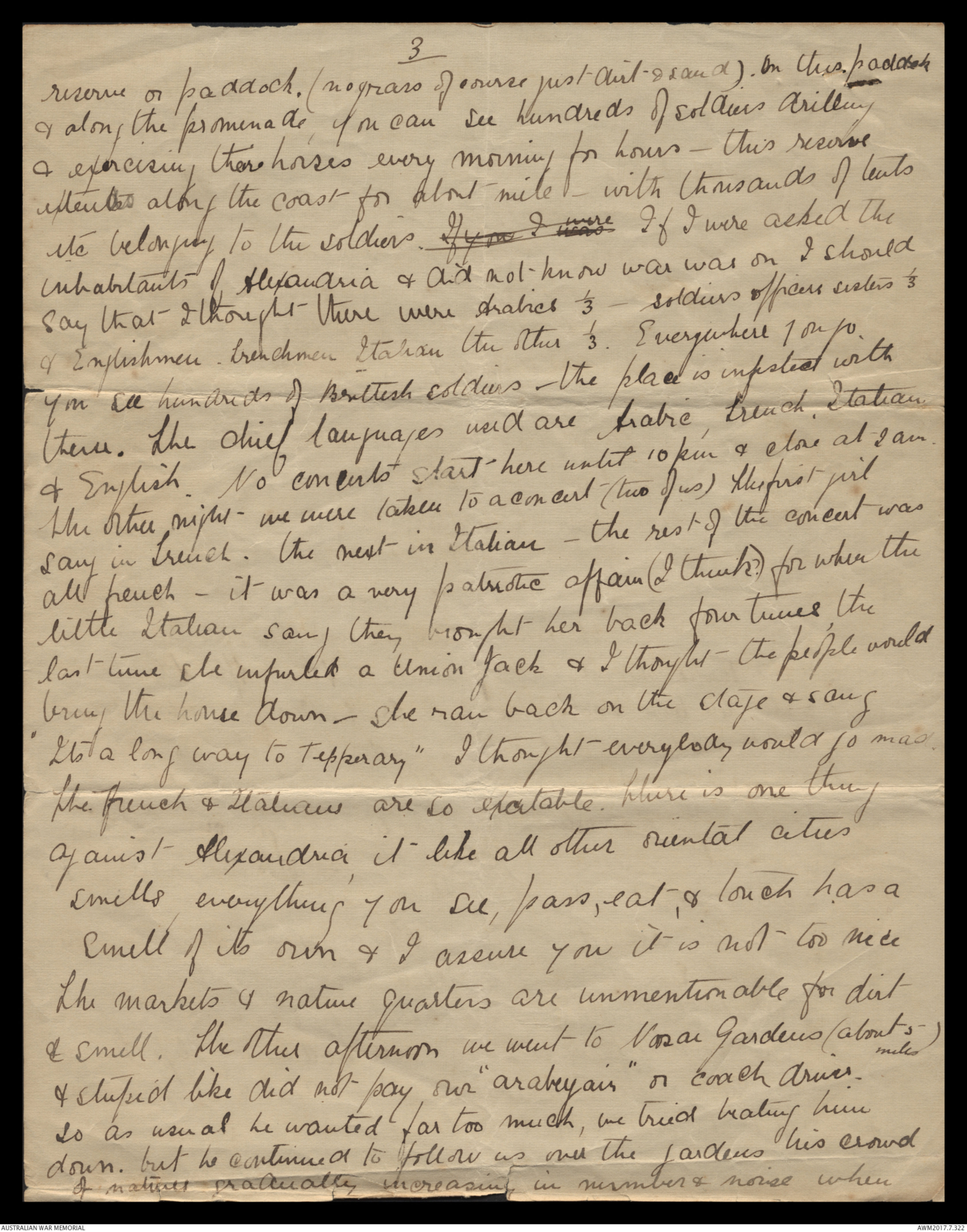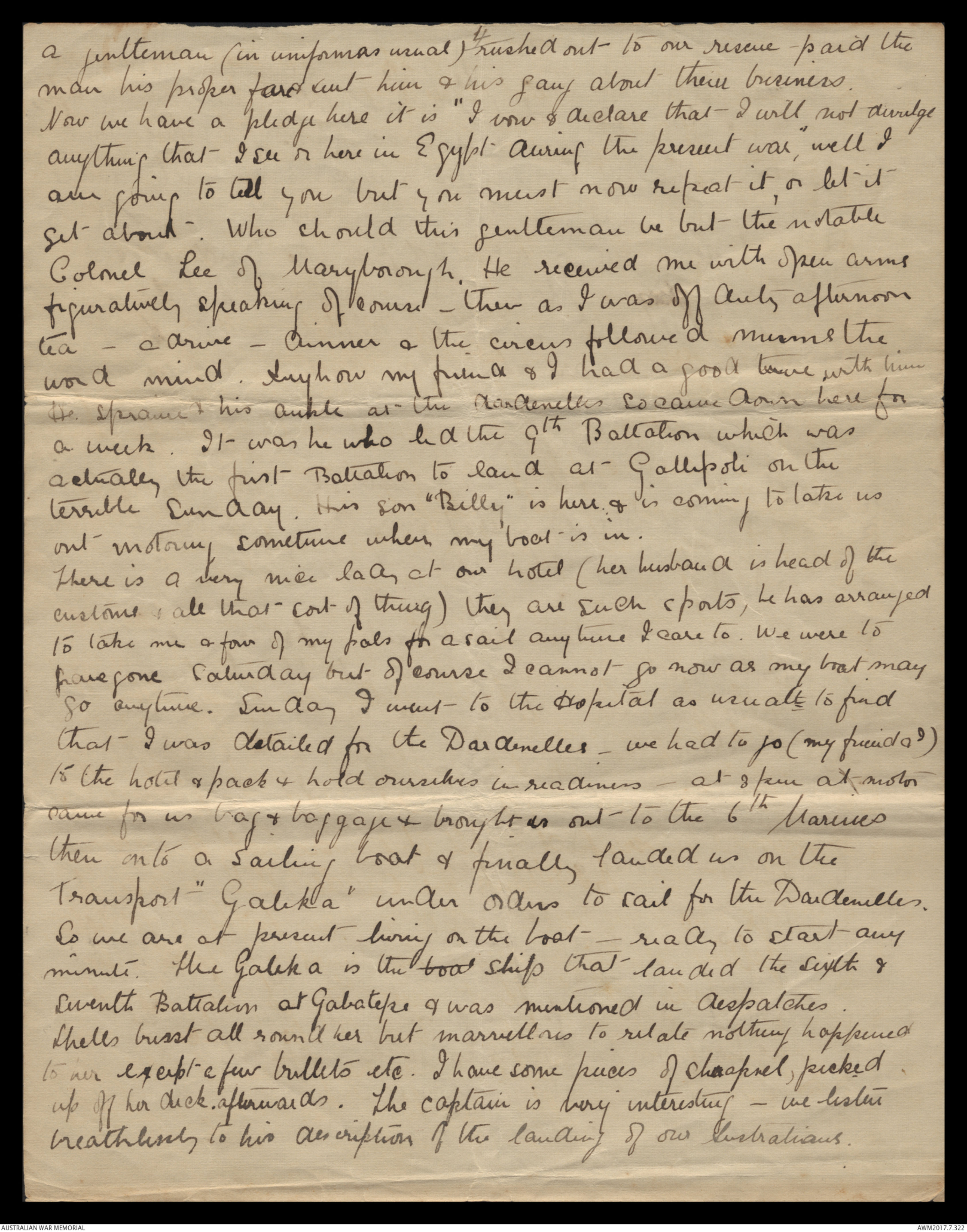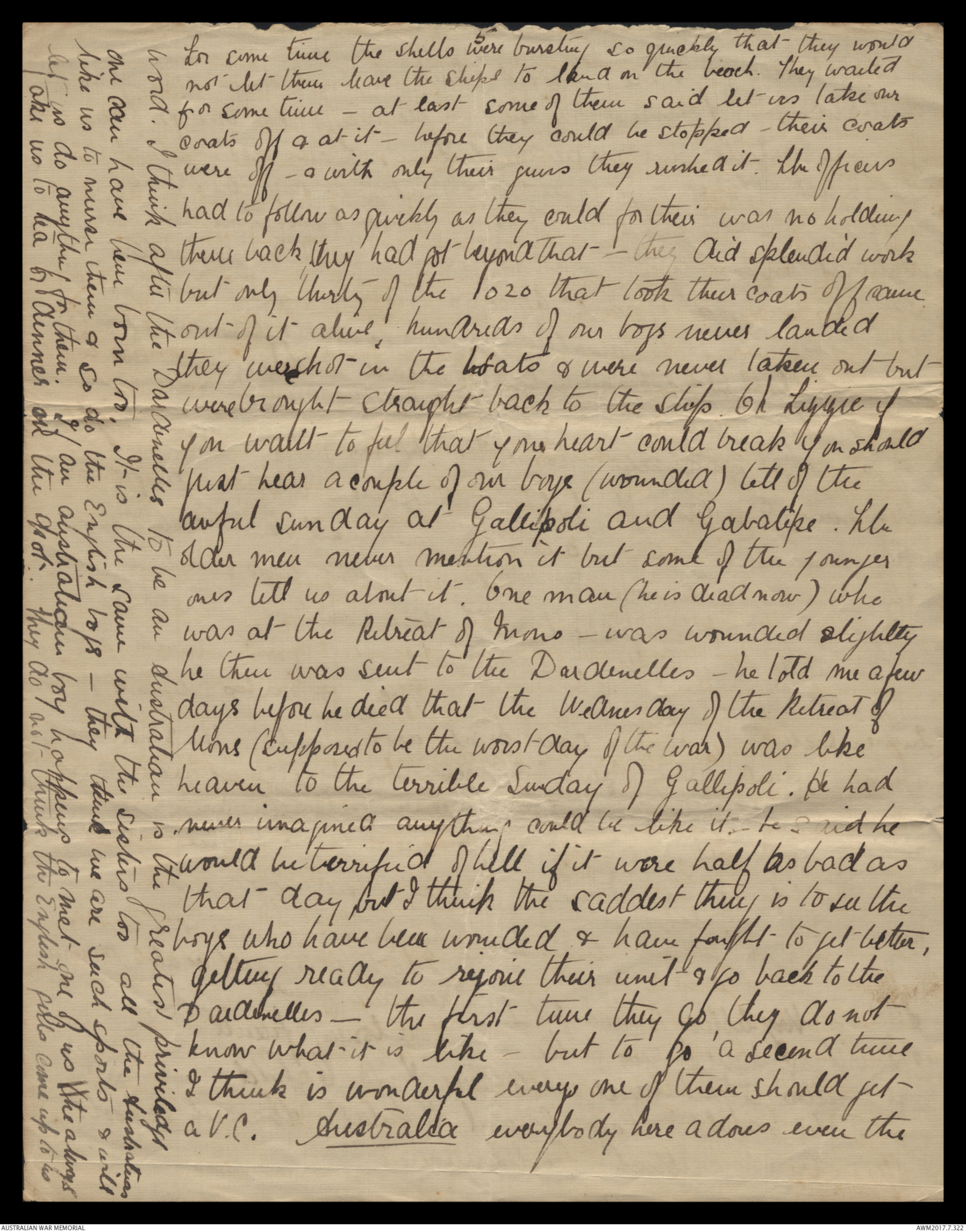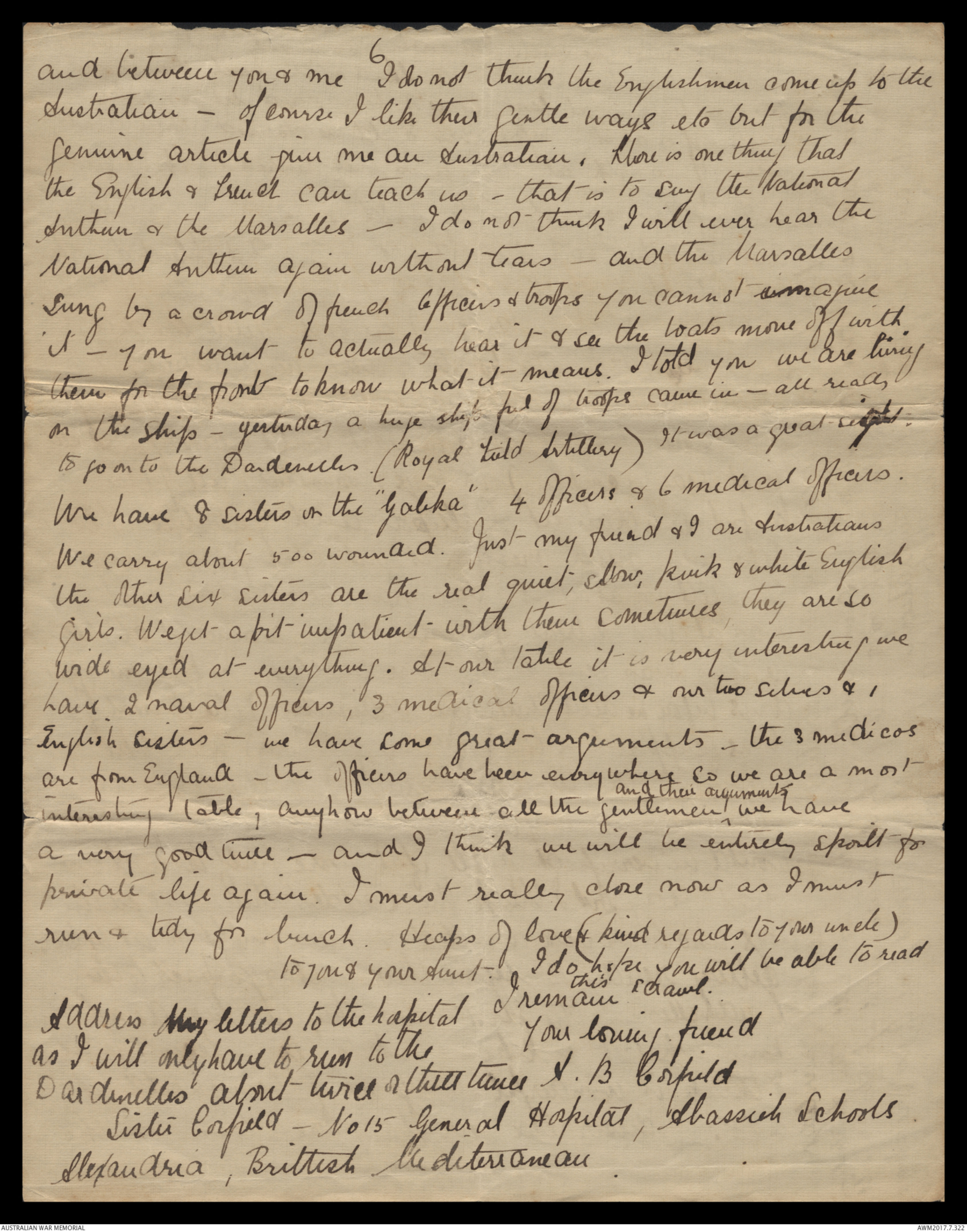Letters from Sister Corfield during 1915 to her best friend Lizzy Ryland - Part 4




3
reserve or paddock. (no grass of course just dirt & sand). On this paddock
& along the promenade, you can see hundreds of soldiers drilling
& exercising their horses every morning for hours - this reserve
extends along the coast for about mile - with thousands of tents
etc belonging to the soldiers. If you I was were If I were asked the
inhabitants of Alexandria & did not know war was on I should
say that I thought there were Arabics 1/3 - soldiers officers sisters 1/3
& Englishmen Frenchmen Italian the other 1/3. Everywhere you go
you see hundreds of British soldiers - the place is infested with
them. The chief languages used are Arabic, French, Italian
& English. No concerts start here until 10 pm & close at 2 am.
The other night we were taken to a concert (two of us) The first girl
sang in French. the next in Italian - the rest of the concert was
all french - it was a very patriotic affair (I think?) for when the
little Italian sang they brought her back four times, the
last time she unfurled a Union Jack & I thought the people would
bring the house down - she ran back on the stage & sang
"Its a long way to Tipperary" I thought everybody would go mad.
The French & Italians are so excitable. There is one thing
against Alexandria, it like all other oriental cities
smells, everything you see, pass, eat, & touch has a
smell of its own & I assure you it is not too nice
The markets & native quarters are unmentionable for dirt
& smell. The other afternoon we went to Nasau Gardens (about 5 miles)
& stupid like did not pay our "arabeyair" or coach driver.
So as usual he wanted far too much, we tried beating him
down. but he continued to follow us over the gardens his crowd
of natives gradually increasing in numbers & noise when
4
a gentleman (in uniform as usual) rushed out to our rescue - paid the
man his proper fare sent him & his gang about their business.
Now we have a pledge here it is "I vow & declare that I will not divulge
anything that I see or here in Egypt during the present war," well I
am going to tell you but you must now repeat it, or let it
get about. Who should this gentleman be but the notable
Colonel Lee of Maryborough. He received me with open arms
figuratively speaking of course - then as I was off duty afternoon
tea - & drive - dinner & the circus followed mums the
word mind. Anyhow my friend & I had a good time with him
He sprained his ankle at the Dardenelles so came down here for
a week. It was he who led the 9th Battalion which was
actually the first Battalion to land at Gallipoli on the
terrible Sunday. His son "Billy" is here & is coming to take us
out motoring sometime when my boat is in.
There is a very nice lady at our hotel (her husband is head of the
customs & all that sort of thing) they are such sports, he has arranged
to take me & four of my pals for a sail any time I care to. We were to
have gone Saturday but of course I cannot go now as my boat may
go anytime. Sunday I went to the Hospital as usualt to find
that I was detailed for the Dardenelles - we had to go (my friend & I)
to the hotel & pack & hold ourselves in readiness - at 8 pm at motor
came for us bag & baggage & brought us out to the 6th Marines
then onto a sailing boat & finally landed us on the
Transport "Galeka" under orders to sail for the Dardenelles.
So we are at present living on the boat - ready to start any
minute. The Galeka is the boat ship that landed the Sixth &
Seventh Battalions at Gabatepe & was mentioned in despatches.
Shells burst all round her but marvellous to relate nothing happened
to her except a few bullets etc. I have some pieces of shrapnel, picked
up off her deck. afterwards. The captain is very interesting - we listen
breathlessly to his description of the landing of our Australians.
5
For some time the shells were bursting so quickly that they would
not let them leave the ships to land on the beach. They waited
for some time - at last some of them said let us take our
coats off & at it - before they could be stopped - their coats
were off - & with only their guns they rushed it. The officers
had to follow as quickly as they could for their was no holding
them back, they had got beyond that - they did splendid work
but only thirty of the 1020 that took their coats off came
out of it alive, hundreds of our boys never landed
they were shot in the boats & were never taken out but
were brought straight back to the ship. Oh Lizzie if
you want to feel that your heart could break you should
just hear a couple of our boys (wounded) tell of the
awful Sunday at Gallipoli and Gabatepe. The
older men never mention it but some of the younger
ones tell us about it. One man (he is dead now) who
was at the Retreat of Mons - was wounded slightly
he then was sent to the Dardenelles - he told me a few
days before he died that the Wednesday of the Retreat of
Mons (supposed to be the worst day of the war) was like
heaven to the terrible Sunday of Gallipoli. He had
never imagined anything could be like it - he said he
would be terrified of hell if it were half as bad as
that day, but I think the saddest thing is to see the
boys who have been wounded & have fought to get better,
getting ready to rejoin their unit & go back to the
Dardenelles - the first time they go, they do not
know what it is like - but to go a second time
I think is wonderful every one of them should get
a V.C. Australia everybody here adores even the
[*word. I think after the Dardenelles to be an Australian is the greatest priviledge
one can have been born too. It is the same with the sisters too all the Australians
like us to nurse them & so do the English boys - they think we are such sports & will
let us do anything for them. If an Australian boy happens to met one of us the always
take us to tea or dinner on the spot. They do not think the English girls come up to us*]
6
and between you & me I do not think the Englishmen come up to the
Australian - of course I like their gentle ways etc but for the
genuine article give me an Australian. There is one thing that
the English & French can teach us - that is to sing the National
Anthem & the Marsalles - I do not think I will ever hear the
National Anthem again without tears - and the Marsalles
sung by a crowd of french officers & troops you cannot imagine
it - you want to actually hear it & see the boats move off with
them for the front to know what it means. I told you we are living
on the ship - yesterday a huge ship ful of troops came in - all ready
to go on to the Dardenelles. (Royal Field Artillery) It was a great sight.
We have 8 sisters on the "Galeka" 4 officers & 6 medical officers.
We carry about 500 wounded. Just my friend & I are Australians
the other Six Sisters are the real quiet, slow, pink & white English
girls. We get a bit impatient with them sometimes, they are so
wide eyed at everything. At our table it is very interesting we
have 2 naval officers, 3 medical officers & our two selves & 1
English Sisters - we have some great arguments - the 3 medicos
are from England - the officers have been everywhere so we are a most
interesting table, anyhow between all the gentlemen ^and their arguments we have
a very good time - and I think we will be entirely spoilt for
private life again. I must really close now as I must
run & tidy for lunch. Heaps of love (& kind regards to your uncle)
to you & your Aunt. I do hope you will be able to read
this scrawl.
I remain
Your loving friend
A.B Corfield
[*Address my letters to the hospital
as I will only have to run to the
Dardenelles about twice or three times
Sister Corfield - No 15 General Hospital, Abassieh Schools
Alexandria, Brittish Mediterranean.*]
 Marisa Bortolotto
Marisa BortolottoThis transcription item is now locked to you for editing. To release the lock either Save your changes or Cancel.
This lock will be automatically released after 60 minutes of inactivity.